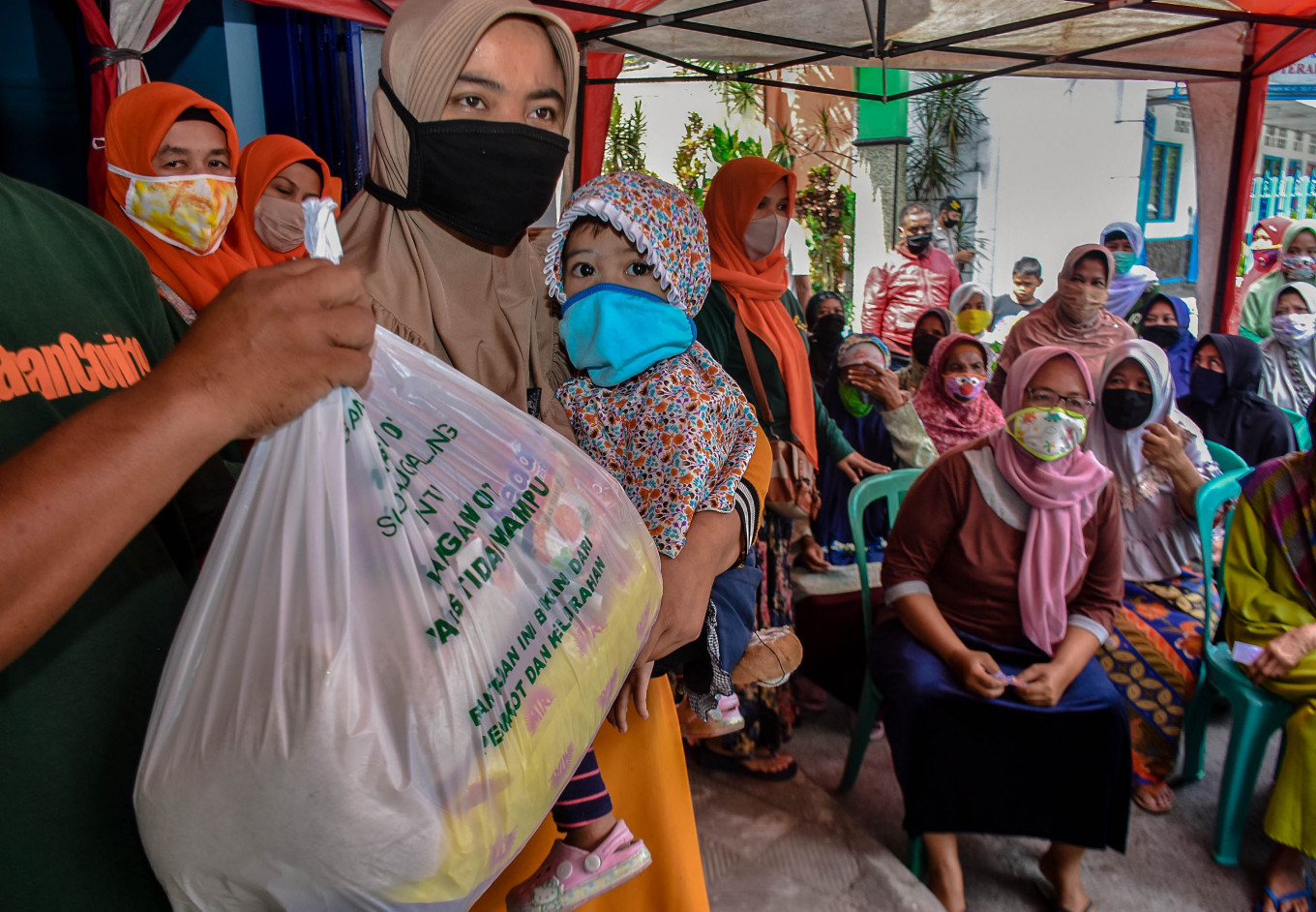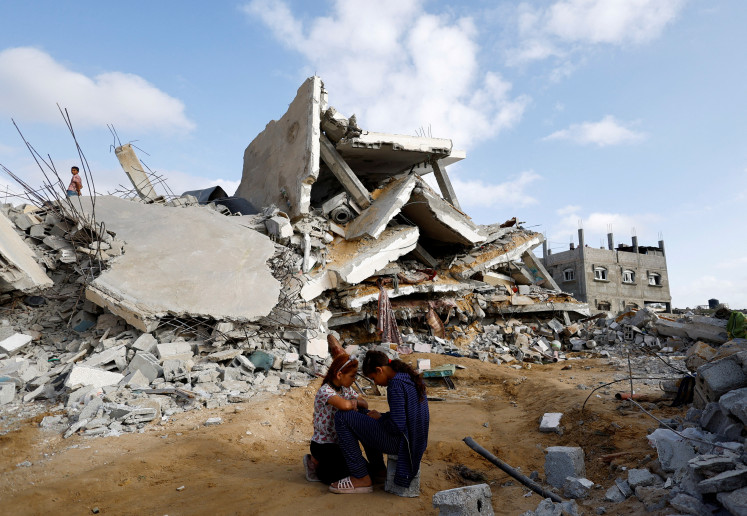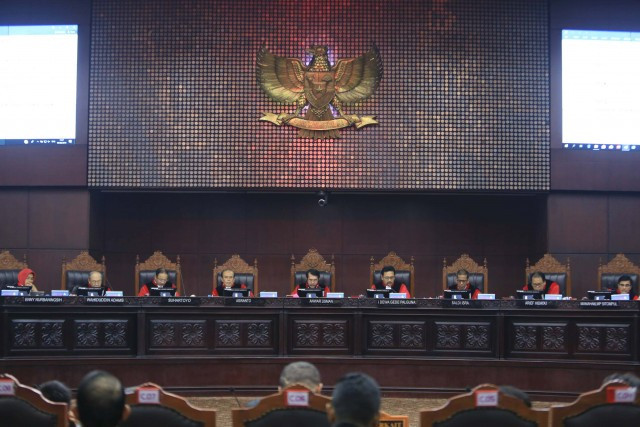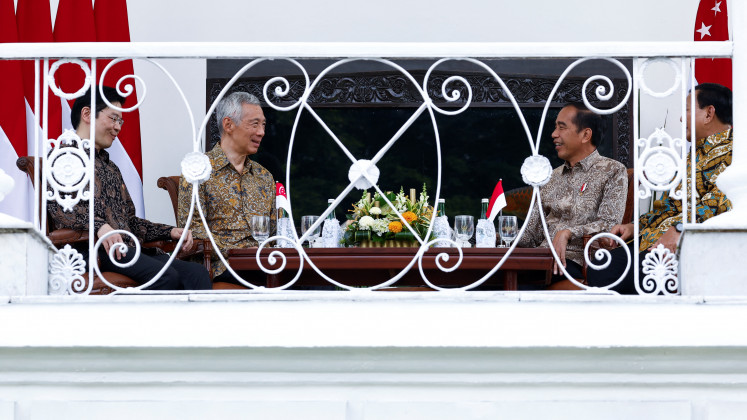Islam prioritizes humanity during pandemic
During Indonesia’s coronavirus epidemic, humanity can be seen from three perspectives: religion, humanity itself and nationality, or Indonesian-ness.
Change Size
 Show of solidarity: Residents of community unit (RW) 7 in Sukoharjo subdistrict, Malang, East Java, line up on Sunday, May 3, to get one of 170 sembako (staple food) packages contributed by their wealthier neighbors to help the poor cope with the economic impacts of COVID-19. The more well-off residents decided to take action because social assistance from the East Java administration had yet to reach the subdistrict. (JP/Aman Rochman)
Show of solidarity: Residents of community unit (RW) 7 in Sukoharjo subdistrict, Malang, East Java, line up on Sunday, May 3, to get one of 170 sembako (staple food) packages contributed by their wealthier neighbors to help the poor cope with the economic impacts of COVID-19. The more well-off residents decided to take action because social assistance from the East Java administration had yet to reach the subdistrict. (JP/Aman Rochman)
H
umanity, or al-insaniyyah in Arabic, can be interpreted simply as all things related to human beings; our existence, activities and needs from the cradle to the grave.
The needs of human life have been enshrined as basic rights or human rights, a legal concept that every individual has inherent rights because he or she is a human being.
During Indonesia’s coronavirus epidemic, humanity can be seen from three perspectives: religion, humanity itself and nationality, or Indonesian-ness.
The Islamic term maqasid sharia refers to the objectives of sharia as a legal concept which asserts that every Islamic law is for a certain purpose as stated in the Quran and the hadiths.
Maqasid sharia comprises five universal principles: (1) protecting the soul/life (hifdzun nafs); (2) protecting religion/belief (hifdzud din); (3) protecting reason/mind (hifdzul aql); (4) protecting the offspring (hifdzun nasl); and (5) protecting property/ownership (hifdzul mal).
Among these five universal principles that underlie human rights in Islam are two views on which principle is the most important. For many pious followers of Islam, the most important is protecting religion or belief and therefore, anything can be sacrificed for this purpose. As a result, many people still insist on attending congregational Friday prayers at mosques, even if the entire congregation faces the risk of exposure to the novel coronavirus – and possibly exposing their families, too.
For the proponents of human rights and humanity, the most important principle is protecting life or the soul. The other principles – including the principle of protecting religion or belief – can be put off, modified or even ignored to protect the soul.
Religious leaders from groups like the Indonesian Ulema Council (MUI), Nahdlatul Ulama (NU), Muhammadiyah and others have issued fatwas and appeals on worshiping during the COVID-19 epidemic.
For example, prayer is for upholding religion as the hadith affirms: “Prayer is the pillar of religion; he who prays preserves religion, and he who abandons it destroys religion.”
But the requirements for prayer can be reduced (rukhshah) for humanitarian reasons. For example, the requisite five daily prayers can be combined and shortened during a journey, or adjusted for the ill and the disabled.
In terms of curbing the transmission of the coronavirus, the congregational prayers that are usually held at a mosque should be replaced by praying at home. Even the Friday prayer and Eid (Idul Fitri) prayer that must be held as a congregation at a mosque or in an open field can be replaced with a group prayer with family members at home.
Another example is the haj pilgrimage, which is also obligatory for Muslims that are able both physically and financially. However, it can also be postponed for humanitarian reasons. COVID-19 is not the only pandemic in haj history that has temporarily halted the pilgrimage.
Humanitarian principles are generally intertwined with the national interest. During Indonesia’s war of independence, for instance, human lives had to be sacrificed in battle against the colonial rulers for the sake of an independent nation. However, during an epidemic, the national interest must be sacrificed for humanity.
According to Finance Minister Sri Mulyani Indrawati, the government has allocated over Rp 400 trillion (US$26.81 billion) in state spending for health intervention measures, a social safety net, industry support and as incentives to help the financial sector toward economic recovery.
Many plans and projects prioritized for national development have been postponed or canceled, with their budgets reallocated to the various efforts to mitigate the outbreak. Human life is everything to a nation. A nation’s leader must not sacrifice humanity for the sake of the national interest.
In this time of COVID-19, no one should be selfish, whether for their faith or the national interest. Religious egoism and the national interest must step aside for the urgent need to protect and save lives during the pandemic.
***
Executive director of Maarif Institute









